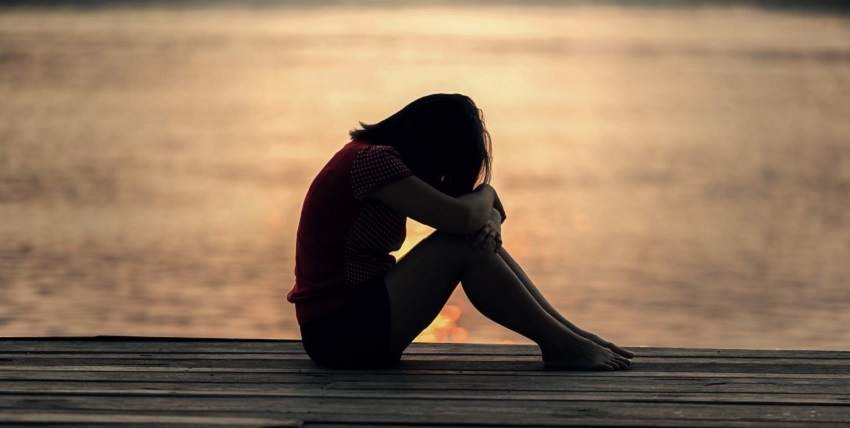After Abortion

Understanding Abortion's Aftermath
It's normal to grieve a pregnancy loss, including the loss of a child by abortion. It can form a hole in one's heart, a hole so deep that sometimes it seems nothing can fill the emptiness. Evidence of post-abortion trauma is increasingly attested to by psychologists, counselors and those involved in post-abortion ministry. We now know, for example, that women hurt by abortion may have some or many of the following symptoms:
- Low self-esteem
- Grief (mild to profound)
- Depression (sometimes to the point of suicidal thoughts and attempts)
- A sense of alienation from family and friends
- A feeling of being 'numb,' not able to feel joy from activities that used to be pleasurable
- Isolating self from others to avoid discussing the abortion experience with them
- Guilt and shame
- Difficulty concentrating
- Anger toward self, or the child's father, or others involved in the abortion decision
- Sleep disorders
- Abortion-related nightmares, flashbacks or even sounds of a baby crying
- Alcohol and drug problems, to dull the sorrow
- Desire for a 'replacement' baby
- Anniversary reactions of grief or depression on the date of the abortion or the baby's expected due date
- Problems bonding with her other children (being over-protective but emotionally distant)
Has abortion left you feeling hurt and/or empty?

Remember you're not alone.
You need a chance to be healed emotionally, physically and spiritually. Ignoring the root cause of a disturbing condition can only make it continue or become worse. Seek healing from people who want to care for your needs.
There are services being offered in order to meet the needs of women who are dealing with emotional, spiritual or physical pain of abortion. The services are free and confidential and run by caring people who are equipped to help you. They want for you to find peace and healing.
Grief
Sometimes a woman will become quite depressed during the months following an abortion. Abortion may have seemed the only way to prevent a loss of social, school career or income standing. Afterwards the aborted mother may feel injured or robbed with no obvious outward focus of her anger.
Denial is also common. She may say that she feels nothing, yet smoke or drink unusually heavily, or consume many tranquilizers. Disappointment in career or love life for which the child was sacrificed can bring about a sense of loss. Some women strive relentlessly to achieve the goal for which the child was sacrificed; yet they end up feeling empty inside.
Upset feelings may be triggered seeing a baby or photos of an unborn child. The aborted mother may feel that she abandoned her child to be "killed by an abortionist".
What can be done
Grief must be allowed to surface so that it can be resolved. Unresolved pain partly explains the "anniversary phenomenon" whereby some women become despondent or attempt suicide on the expected delivery date of the aborted child or on the anniversary of the abortion.
Well meaning people may say "Forget it" or "don't blame yourself." This approach prevents grief from being worked through.
Healing and support after abortion
Steps toward healing
1. Recognize that the road to full recovery can take time and effort. Sorting out your life and your feelings, overcoming the ever-present temptation to give in again to despair and doubt, these take time.
2. Recognize that it is normal and good to mourn the loss of a loved one. Just as mourning the loss of a parent or spouse takes time, so does mourning the loss of an aborted child. In the case of abortion, the mourning process is often cut short and never completed because of denial or feelings of guilt which block the mourning process. You must courageously allow the mourning process to get back on track. Accept your grief as normal rather than something which must be covered up or pushed away. Recognize that the pain of your loss will fade as your healing progresses.
3. Recognize that you are not alone. Others have been through the same experience and the same trials. Their experiences and understanding can help you. They want to help you, just as you may want to help others after you have finished going through the healing process. Finding a post-abortion counselor or support group through our list of Post-Abortion Healing Resources may be very helpful to you.
4. Forgive others. Recognize that they, too, acted out of ignorance, fear, or petty human selfishness. If possible, let them know that you forgive them. Forgive the abortion providers.
Support Groups
Women Hurt - Tel: Grace 01 8214205
"The group brought me back from loneliness and isolation. I was saved from self-hatred and self-punishment. The group has shown me love and compassion. For the first time I could face my abortion and not feel devastated. My broken life was healed and made stronger. Fear, guilt, anger and self-hatred were replaced by love, acceptance peace and self love"Caroline
Rachel's Vineyard Tel: Bernadette : 087 8592877
British Victims of Abortion
Olympic House, 142 Queen Street, Glasgow G1 3BU
00 44 141 226 5407 info@bvafoundation.org
National Office of Post Abortion Reconciliation and Healing
3501 S. Lake Drive, PO Box 07477, Milwaukee, WI 53207 - 0477, USA
The Elliot Institute
PO Box 7348, Springfield, Il 62791, USA
www.afterabortion.org

Helping a friend after abortion
Someone you know has had an abortion. You care about this person. You see that she is suffering and ask yourself, "What can I do?"
Adjust your own attitude
You can't change the abortion itself. Fill your heart with compassion and wisdom to support and help her find peace
Listen carefully and with your heart
This can be her most valuable support. Her pain and grief must be released if healing is to begin. When you listen without judging it helps her begin to trust in the hope of peace and forgiveness.
Choose your words carefully
Once she has shared the background of her abortion with you, a loving response is "How can I help?" Follow her lead and let her guide you through her emotions. She may need professional assistance, but you can be the added support she desperately needs.
Help her to grieve in healthy ways
Our natural instinct is to protect and shield her from pain. This may be especially true if she is a close friend or relative. We might even encourage her not to think about it, to put it in the past and concentrate on happy things. This does not foster healthy grieving. In fact, healing will not come until she has been allowed to work through her grief.
Encourage her to grieve for her unborn child; do not minimize her pain. Her heart will tell her how many tears are necessary. She has to grieve for her lost child, a grief that is compounded by her guilt in making the decision to abort her child.
Help her to forgive herself
Help her to realize that while she was making the abortion decision, others may have played a part by not supporting her to carry her baby to term. Perhaps her spouse, her boyfriend, parents or friends pressurized her to have the abortion. These facts help her see how overwhelmed she may have been without proper support from others.
She also made the decision when her body was experiencing the hormonal changes of pregnancy. Studies show the mood levels range from depression to feelings of elation during pregnancy. As she deals further with the abortion, she will see more realistically her part in the decision and the part others played.
The woman may also feel bitter toward those associated with the abortion. She may resent those who withheld support. She may be angry with those who worked at the abortion facility and feel she was misled or victimized. Abortion counselling in the clinic is minimal; the woman is given no understanding of fetal development or the risk of serious physical and psychological side effects. All these feelings are common. Encourage her to talk about and to work through them.
Affirm the woman
It takes courage to deal with major problems. Encourage her to give herself credit. Tell her that peace and light wait on the other side of her pain.
Respect the confidences place in you
This woman has trusted you as her confidante; a sacred privilege and serious responsibility. Treat all confidential information with utmost respect.
Helping a woman heal after an abortion involves a process that begins with practical help and physical healing and moves toward spiritual help and healing.
Believe in your ability to help. One would do exactly what you are doing. One would reach out to her in her pain and care deeply for what she is going through. One would give her hope that life can once again have meaning.
Abortion is a tragedy. Yet, there is hope and healing and love. Your compassion may make the difference in her belief that she can be whole again. You may be the vessel for her very healing and journey back from abortion.